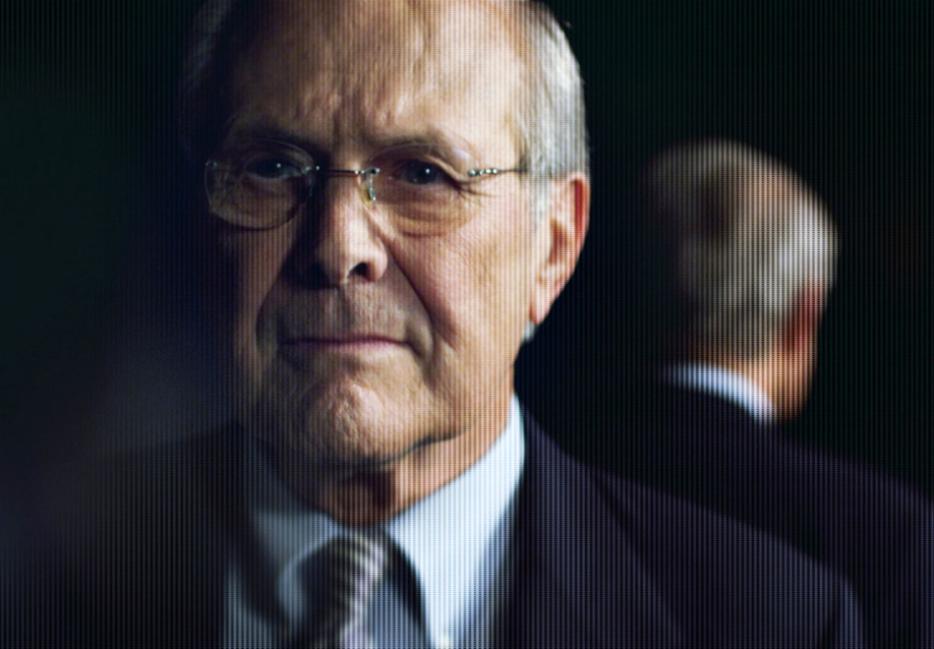Near the end of 2013’s The Unknown Known, Errol Morris’s 90-minute exercise in vexation with Donald Rumsfeld, the Oscar-winning documentarian asks the former secretary of defense the simplest question of the film: “Why are you doing this?” In what might be the closest thing to a straight answer Rumsfeld gives, he smirks a mildly frustrated smirk—at this point in the movie, Rumsfeld has flashed grins so fulsome and relentless that you can start picking out their subtle flavours, like a bullshit sommelier—and says, “Oh, that’s a vicious question. I don’t know.”
It’s certainly possible that’s true: the movie is nothing if not a portrait of a man who is, at least publicly, resolutely incapable of self-examination. Watching him, though, it’s patently evident that Rumsfeld loves the game, loves to skip and jump and swing through an interrogator’s questions, hanging on phrasings and wading through minutiae. The game is probably that much more fun for Rumsfeld because he is always convinced he’s winning.
This is the curious gap in self-awareness of Donald Rumsfeld: it’s not that he lacks the capacity for self-reflection, or even that he’s too guarded to say anything of meaning in the public sphere, but that he thinks we’re all buying it, that his blizzard of bravado and nonsense is cowing us, if not convincing us. His biggest, most ecstatic grin comes after he repeats an emphatically meaningless phrase from his book Rumsfeld’s Rules: “All generalizations are false, including this one.” His grin says he knows full well that’s bullshit, but it also says that he thinks it’s such high-grade bullshit that the rest of us might mistake it for a Rubik’s Cube.
Rumsfeld presents a unique problem for any interviewer, one that Morris mostly elides by making his film about that problem: an honest person will talk about the truth, a liar can be led (or tricked) there, but someone like Rumsfeld doesn’t even exist on a plane where truth is a meaningful concept. Morris can get Robert S. McNamara to admit he acted as a war criminal, Carol Off can wrong-foot Conrad Black just enough to get him to have to adjust his spin, but Rob Ford will forever think he’s reverse-Jesus, turning vodka into water and healing Toronto’s ills by laying hands on a weight machine.
Assuming that merely displaying this absurdity is best left to the long view of the documentarians, and that even that is only so helpful in terms of actually trying to understand the world, this seems like something of an immovable object for anyone whose job (or at least hobby) is to explain things. Rumsfeld’s press conferences were legendary for their combination of grandstanding—it’s easy to play big when your soapbox is made of solid earth—and futility: they were pure stage show. With one or two obvious slips, and more physical comedy, Ford’s are the same. No one, neither interrogator nor interrogated, learns anything from them; at best, they might convince a few more people that some delusions are infinite, and at worst they help the mindless fog encroach on our world a little further.
Neither of those really counts as bad for the people behind the screen, at least not while they can still get up and lay it on thicker. Rumsfeld was never prevented from one of his glaring blunders, and Ford rode his into a full mayoral term (and possibly, good lord, a second). The only thing that might prevent this from becoming a winning political strategy is that their level of unshakeable confidence is relatively rare, although the competitive nature of politics has almost certainly started selecting for it already.
The most tempting solution is to effectively ignore them, maybe talk about them but never to them. There’s some wisdom in that, but given that some people will share their opinions, if not their method of reaching them, that runs the risk of only amplifying what they’re saying by never bearing witness to its absurdity. And even that assumes that we have the wisdom or knowledge to spot the delusional among the more garden-variety liars and obfuscaters. As the frontline reporters explain to Morris in this New York Times piece, part of the problem with Rumsfeld during the lead-up to the Iraq war was that you never really knew what he actually knew; like all things, this is much clearer in hindsight.
So we’re kind of left with throwing ourselves against a wall that will never give; or, maybe more accurately, into a fog that won’t even give us the satisfaction of pushing back. That old chestnut about defining insanity as doing the same thing repeatedly and expecting different results seems applicable, but rationality has never been a particularly effective weapon against irrationality. All we can really hope is that irrationality as armor doesn’t catch on.






